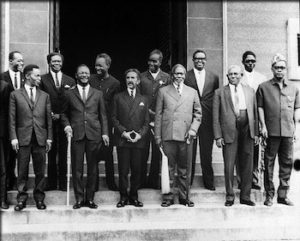
*The Organization of African Unity (OAU) was established on this date in 1963. Formed in Addis Ababa, Ethiopia, with 32 signatory governments, Kwame Nkrumah of Ghana was one of the key figures in the establishment of the OAU.
Some of the key aims of the OAU were to encourage political and economic integration among member states and to eradicate colonialism and Neo-colonialism from the African continent. The organization was widely derided as a bureaucratic "talking shop" with little power. It struggled to enforce its decisions, and its lack of armed force made intervention exceedingly difficult. Civil wars in Nigeria and Angola continued unabated for years, and the OAU could do nothing to stop them. The non-interference policy in the affairs of member states also limited the OAU's effectiveness. Thus, when human rights were violated, as in Uganda under Idi Amin in the 1970s, the OAU was powerless to stop them.
The organization was praised by former Ghanaian United Nations Secretary-General Kofi Annan for its efforts in bringing Africans together. Nevertheless, in its decades of existence, critics argue that the OAU did little to protect the rights and liberties of African citizens from their political leaders, often dubbing it a "Dictators' Club" or "Dictator's Trade Union." The OAU was, however, successful as many of its members were members of the UN, too, and they stood together within the latter organization to safeguard African interests amid lingering colonialism. Its pursuit of African unity, therefore, was in some ways successful.
However, achieving total unity was difficult, as the OAU was largely divided. The former French colonies, still dependent on France, had formed the Monrovia Group, and a further split emerged between those who supported the United States and those who supported the USSR during the Cold War of ideologies. Ghana led the pro-socialist faction, while the Ivory Coast led the pro-capitalist faction. Due to these divisions, the OAU struggled to take action against states involved in internal conflicts, as it often found it difficult to agree on a course of action.
The OAU did play a pivotal role in eradicating colonialism and white minority rule in Africa. It gave weapons, training, and military bases to rebel groups fighting the white minority and colonial rule. The OAU convinced the UN to expel South Africa from bodies such as the World Health Organization. The OAU also collaborated with the UN to alleviate refugee issues. It established the African Development Bank to finance economic projects and strengthen Africa's financial position.
Although all African countries eventually won their independence, it remained difficult for them to become totally independent of their former colonizers. There was often continued reliance on the former colonial powers for economic aid, which often came with strings attached: loans had to be paid back at high interest rates, and goods had to be sold to the aiders at low rates.
The United States and the Soviet Union intervened in post-colonial Africa to pursue their objectives. Help was sometimes provided in the form of technology and aid workers. Despite the fight to keep "Westerners" (colonialists) out of African affairs, the OAU failed to achieve the goals set up to advocate for African affairs. The Organization still heavily depended on Western help (military and economic) to intervene in African affairs, despite African leaders' displeasure at dealing with the international community, especially Western countries. It was disbanded on July 9, 2002, by its last chairman, South African President Thabo Mbeki, and replaced by the African Union (AU).